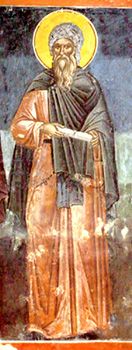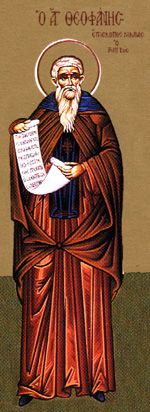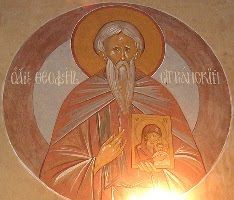Theophanes was born in Constantinople, and belonged to one of the noblest families of the Byzantine Empire. Based upon his lineage, he was entitled to all the finest things in life, which his parents provided to him. Sadly, he was left orphaned at the young age of three, inheriting his family’s luxurious estate. Theophanes was placed under the guardianship of the current emperor, Constantine Copronymus, who personally raised the boy in his court.
At the young age of 12, Theophanes was coerced into marriage, despite his wish to remain celibate for the Lord. One the day of his wedding, however, Theophanes—filled with the Holy Spirit—eloquently convinced his wife of the brevity of life and the call to serve the Lord. Together, they took a vow of perpetual chastity. This angered the emperor, who wished for Theophanes and his wife to produce heirs to his enormous fortune. As punishment, the young couple was sent to Cyzicus, a port city, and given the title of the Royal Manager of Public Works.
The emperor’s plan backfired, however, and upon arrival, Theophanes met a monk who instructed him in the ways of contemplation and prayer. So moved by this newfound experience of God, Theophanes abandoned the world, his position, and estate, and joined a monastery. His wife, similarly, entered a convent. Theophanes would go on to build two monasteries in Mysia, becoming Abbot of the monastery referred to as Megal-Agre.
As abbot, the wisdom and piety of Theophanes were quickly noticed and sought out. He lived a life of austerity, doing daily penance, wearing a hair shirt constantly, and sleeping on the ground with a rock for his pillow. His diet was limited to water and coarse, dry bread. Eventually, he developed significant health problems which plagues him for the remainder of his life, but which he bore cheerfully. As his reputation grew, membership at his monasteries increased quickly, and many came to him with questions and for spiritual guidance. The monastery, under his direction, became known for being virtuous and holy. During this time, Theophanes began writing a history of the Christian world starting with the end of the Diocletian persecution, and continuing to the early ninth century. These “Chronicles” of Christianity earned him the nickname “the Chronicler.”
Theophanes lived in peace at his monastery, offering spiritual direction to his monks, and writing history for some time. However, in 814, Emperor Leo the Armenian renewed the persecution against the Church, specifically citing the use of holy images and icons. Theophanes spoke out against this law, maintaining the importance of iconography, and working to prevent their destruction. The emperor, aware of the great respect that Theophanes held among the faithful, hoped to enlist him in his cause with trickery. He summoned him to Constantinople. Theophanes, for his part, understood the trap he was walking into, but obediently traveled to meet the emperor. There, he received this message:
“From your mild and obliging disposition, I flatter myself you are come to confirm my opinion on the point in question [the destruction of images] with your support. This is the readiest way to obtain my favor, and, with that, the greatest riches and honors for yourself, your monastery, and your relations, as much as it is in the power of an Emperor to bestow.
“But if you refuse to comply with my desires in this affair, you will incur my highest displeasure, and draw misery and disgrace on yourself and your friends.”
Saint Theophanes returned the message, stating:
“Being now far advanced in years and much broken with pains and infirmities, I have neither relish nor inclination for any of those things which, for Christ’s sake, I despised in my youth, when I was in a condition to enjoy the world. As for my monastery and my friends, I place their destiny in the hands of God.
“If you think to frighten me into compliance by your threats, as a child is awed by the whip, you only lose your time. For though I am without the strength to walk and subject to many other corporal infirmities, I trust Jesus Christ that, in defense of His cause, He will give me the strength and courage to suffer for His cause the sharpest torments you can inflict on my weak body.”
The life of Saint Theophanes is a perfect example of our Lenten journeys. Not content with comfort and privilege, this holy man sought out the Lord in whatever manner he could, centering his life on Him, and working each day of his life to grow closer to true conversion. Along the way, he suffered persecution and illness, and engaged in personal practices of penance, prayer, and contemplation. How might the life of Saint Theophanes inspire us to improve our focus, our practices of penance, our prayer during this Lenten season?
Year 2: Day 71 of 365
Prayer Intentions: Lives centered on the Lord alone.
Requested Intentions: For the victims of the Japanese tsunami/earthquake (J); Healing (E); For a son struggling with depression (B); Successful conception (M); Freedom from social anxiety; confidence in the Lord (J); Improved success in employment and studies (D); Freedom from illness (T); For a wife’s employment (E); Healing of a husband’s knee (M); Freedom from sickness (R); Healing (C); Restoration of marriage (F); Freedom from medical difficulties, employment, successful relationship (D); End to suffering for sick brother; reconciliation of estranged family (E); End to husband’s addiction; Improved relationship; strength (M); Successful God-centered marriage; Sacramental life (M); Healing, successful relationship (S); For successful marriage (A); For a husband’s freedom from addiction (C); Freedom from pain and illness for a friend (M); Financial freedom (J); Successful passing of occupational examination (S); Healing and conversion, sale of house (L); Occupational success for employee and colleagues (J); Employment for a son (C); Successful attainment of an important appointed position (J); Recovery from cancer for a friend (Z); For a family’s freedom from sin (M); For a daughter with Diabetes (A); Healing of a father following stroke (S).
















0 comments:
Post a Comment
Thanks for leaving a comment. If you wish to submit a prayer request, however, please do so above, using the "Contact" tab.